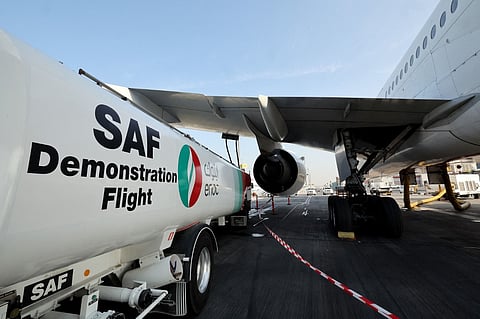
- NEWS
- the EDIT
- COMMENTARY
- BUSINESS
- LIFE
- SHOW
- ACTION
- GLOBAL GOALS
- SNAPS
- DYARYO TIRADA
- MORE

The aviation sector, poised to become a major economic growth driver, is one of the main contributors to global carbon emissions. Industry players are, thus, rushing to decarbonize their operations by using sustainable aviation fuel or SAF.
However, Cebu Pacific Chief Strategy Officer Alex Reyes argued that the initiative needs government support before it can fully take off. For instance, he said government partners could "put in the proper incentives so that more capital flows into this vital industry."
"There needs to be a coordinated effort throughout the complicated supply chain of aviation to achieve these investments, to get all these massive amounts of SAF refineries," Reyes said at a recent aviation forum.
"If everyone can put SAF on top of their agenda, it all brings us to a much better place for the entire aviation sector," he added.
Cebu Pacific was the first low-cost carrier in Southeast Asia to incorporate SAF into its operations when it took delivery of its third A330NEO in May last year.
CEB is scheduled to receive 21 aircraft deliveries this year, 17 of which are new engine options or NEOs, while four are current engine options or CEOs on short-term leases.
The airline aims to shift to a more fuel-efficient, all-NEO fleet by 2028. It also aims to utilize SAF by launching green routes by 2025 and using SAF for its entire network by 2030.
SAF is an environmentally sustainable and chemically identical alternative to fossil fuel-based aviation fuel. It can be processed from plant and used oil feedstock such as forestry and agricultural waste and used vegetable oils.
It does not require any adaptations to the aircraft or engines and does not have any negative impact on performance. Using SAF results in up to 80 percent reduction in carbon emissions across the fuel's lifecycle.
Locally, one potential feedstock for SAF is coconut oil or CNO, which is also used for biodiesel production.
Last February, the DOE reportedly met with the Civil Aviation Authority of the Philippines, the Philippine National Oil Company, and the European Aviation Safety Agency or EASA to discuss the potential advantage of exploring SAF in the country in compliance with the Carbon Offsetting and Reduction Scheme for International Aviation or CORSIA by 2027.
Cebu Pacific Chief Executive Officer Michael Szucs also recently conveyed the Philippines' strategic position to serve more domestic and international passengers.
"The Philippines has a moment here with this young middle class, increasing the wealth of the nation but also wanting to travel. We are strategically placed within the ASEAN region to be a hub, allowing more connectivity between all the people in this region," Szucs said.
"The growth story is impressive and consistent, and the tourism potential here is massive. This is the moment; this is the opportunity to get back. Now is our time to get back to that pedestal, to that very top," he added.
Cebu Pacific currently flies to 35 domestic and 24 international destinations spread across Asia, Australia, and the Middle East.
